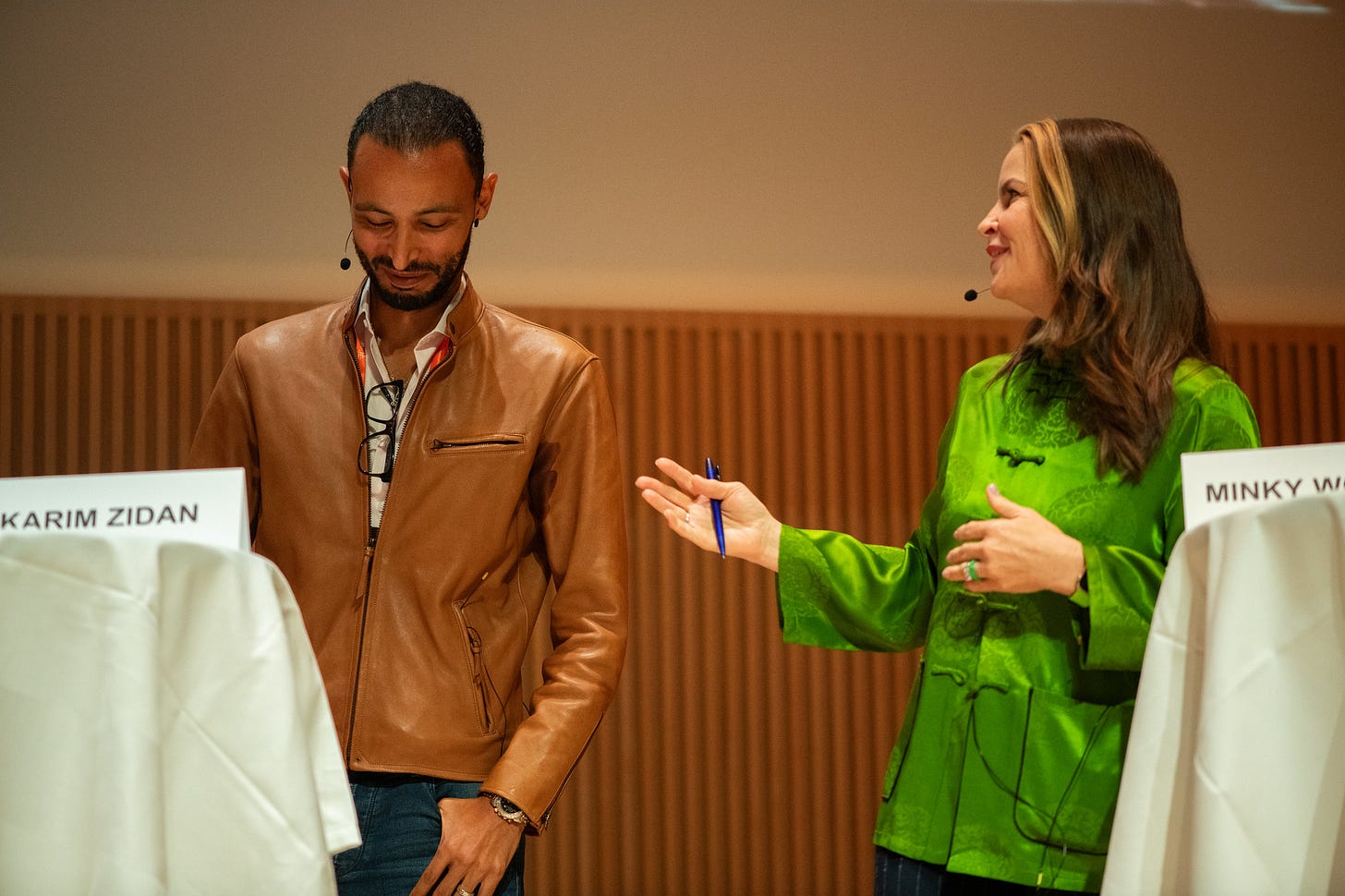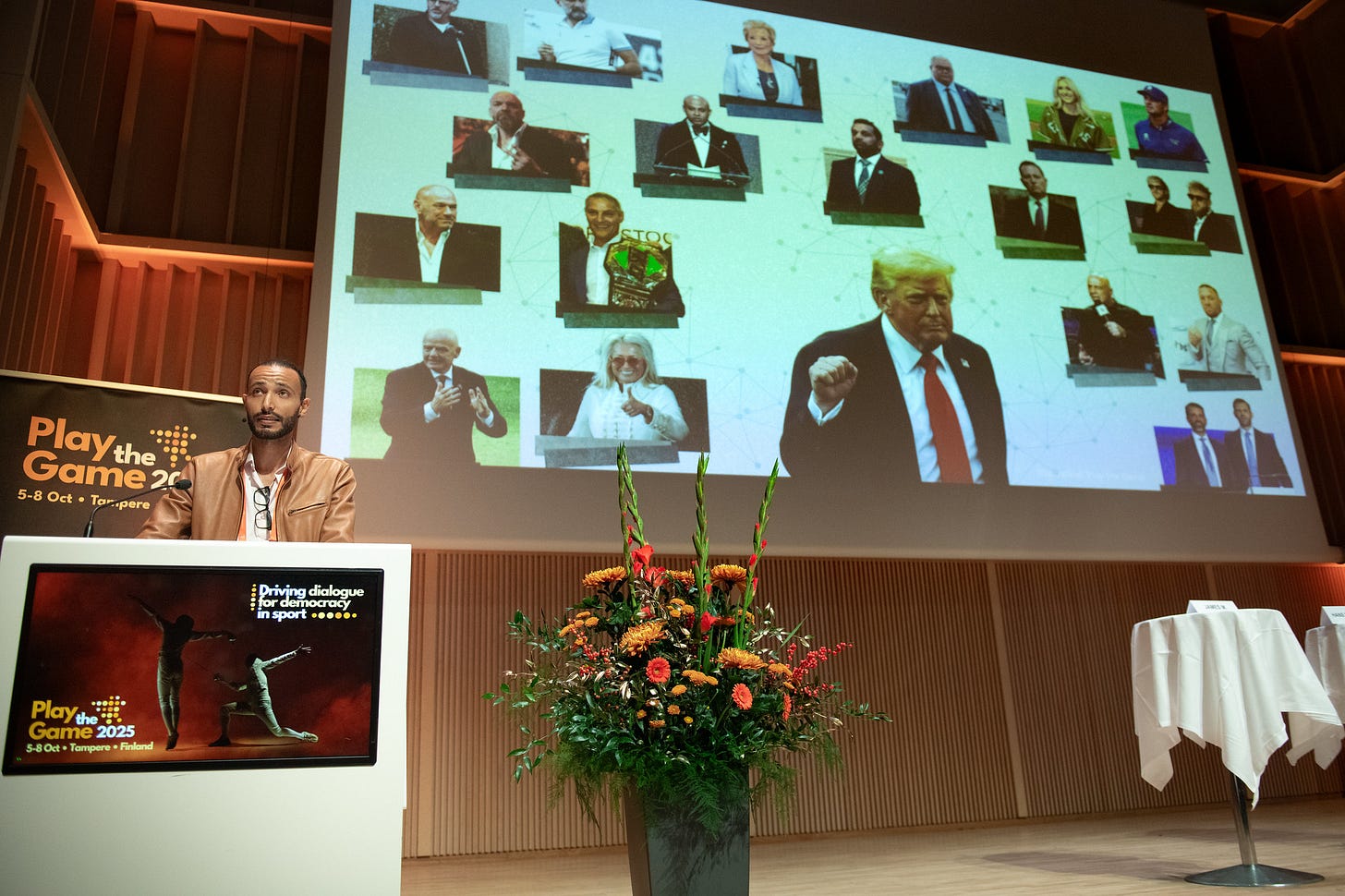Speech: Trump, the UFC, and the new world order in sports
In my speech at Play the Game 2025, I delve into Donald Trump’s bond with the UFC and reveal the cast of power players shaping his sports agenda.
Welcome to Sports Politika, a media venture founded by investigative journalist and researcher Karim Zidan that strives to help you understand how sports and politics shape the world around us. My mission is to offer an independent platform for accessible journalism that raises awareness and empowers understanding.
If you share this vision, please consider supporting my work by joining becoming a paid subscriber. I am currently running a special offer whereby you can secure a subscription at a 40% discounted price…forever.
I’d had less than two hours of sleep when I took the stage at Play the Game 2025, staring out at more than 500 attendees and a topic that seems to follow me everywhere: Donald Trump and the UFC.
The event, which is currently taking place in Tampere, Finland, brought together intrepid journalists, activists, whistleblowers, athletes, and academics with the shared objective of delving into the shadowy corners of the sports world. For example, my speech and panel followed an opening keynote by Maggie Nichols, the former elite American gymnast and NCAA champion who became a key whistleblower in exposing Larry Nassar’s abuse, and a Q&A discussion with Caster Semenya, the two-time Olympic champion from South Africa whose career has been defined by both her dominance on the track and her legal battles over gender and eligibility rules in sport.
I shared the stage with some of the most respected names in the sports-politics landscape, including Jules Boykoff, an American author and academic who is the foremost expert on the politics of the Olympic Games; Minky Worden, Human Rights Watch’s Director of Global Initiatives and one of the most vocal advocates in the space; and James M. Dorsey, the award-winning journalist and scholar who runs the excellent The Turbulent World with James M. Dorsey.

The way these sessions work is that each speaker is invited to give a 10-minute talk on a topic tied to the themes of the session, in this case, the “battle between sports and politics on U.S. soil.” While several of my esteemed colleagues focused on the upcoming 2026 FIFA World Cup and the 2028 Olympic Games in Los Angeles, I retreated to the familiar world of cagefighting, explaining to the audience how the UFC helped put Trump back in the White House. I also introduced my recently completed project for Play the Game that maps Trump’s extensive use of sports as both a personal branding tool and a central instrument of political power and public influence.
You can find my speech, as well as recording of the entire session, below.
Good afternoon, everyone
I want you to take a moment to picture something with me: it’s a humid summer night in Washington, DC. You are standing on the manicured South Lawn of the White House, home of the President of the United States, and a living museum of American history.
Where presidents once welcomed heads of state, and even held the annual Easter Egg hunt, a steel cage now stands, its black mesh and bloodied canvas contrasting against the white columns of the Executive Mansion. Floodlights wash the lawn in an artificial glow, and a lit arch frames the Washington Monument like a silent spectator beyond the cage.
Five thousand handpicked guests crowd close while massive screens project every punch and kick to tens of thousands more gathered outside the gates. Fireworks crackle overhead as the country celebrates its 250th anniversary with a mixed martial arts event.
As bizarre as this may sound, this is precisely the setting planned for an Ultimate Fighting Championship show at the White House next year—an event I believe is the culmination of Donald Trump’s fusion of sports, politics, and spectacle.
This picture was unveiled last month by Dana White, the UFC’s brash and foul-mouthed CEO who also happens to be one of Donald Trump’s closest allies. He repeatedly endorsed Trump and even produced a propaganda documentary on Trump entitled Combatant-in-Chief. And when Trump won the 2024 presidential election, it was White who took the stage at his victory party – because, naturally, Trump needed his favourite fight promoter to seal the deal.
Make no mistake about it: the UFC helped put Trump back in the White House. Trump frequently attended UFC events, basking in the admiration of the young, predominantly male crowd. He cultivated relationships with fighters, leveraging their support to portray himself as a symbolic strongman.
And now, he is leveraging the UFC to stage arguably the biggest example of sports propaganda in American history.
Trump’s unique relationship with the UFC is a topic I have been reporting on extensively for the past decade and is a major theme in my upcoming debut book. It also served as the inspiration for an in-depth project with Play the Game that maps Trump’s relationship to sports and the sprawling cast of athletes, sports executives, media influencers, and politicians who helped bring his sports spectacles to life.
While Trump has long used sports as a stage to launder his reputation, promote his brand, and propagate his political ideology, his efforts have never been a solo act. This project highlights the most prominent sports figures in Trump’s orbit, detailing their ties to him, the roles they have played in advancing his agenda, and the personal or political gains they have sought in return.
While I will not be able to walk you through the entire cast due to limited time, I wanted to focus on some of the key figures from the UFC, as they form some of the most recognizable and influential figures in Trump’s orbit.
This is Ari Emanuel, CEO of Endeavor and one of the most influential figures in entertainment and media. Beyond Hollywood, he owns both the UFC and World Wrestling Entertainment (WWE)—two cultural powerhouses with massive, loyal audiences. Emanuel also has a long-standing personal connection with Donald Trump, having served as his agent during his time on the reality show The Apprentice. Despite being a registered Democrat and the brother of Rahm Emanuel, Barack Obama’s former chief of staff, he’s maintained a friendly rapport with Trump that has endured well into the political arena.
Under Emanuel’s leadership, the UFC and WWE have experienced a noticeable rightward shift, increasingly amplifying pro-Trump messaging and cultural narratives. Emanuel, in turn, has leveraged this relationship for access, influence, and deal-making, positioning himself at the intersection of politics, entertainment, and power.
The next two characters are much more recognizable, starting with Conor McGregor. The controversial former UFC champion made headlines when he visited the White House on St. Patrick’s Day this year, invited by Trump in place of the Irish Prime Minister.
Though McGregor hasn’t fought in several years, he has stayed in the spotlight through a string of controversies, including being found liable for sexual assault in November 2024. He has also become a figure embraced by the Irish far-right, using his platform to sow division. His White House meeting appeared to be an effort to legitimize his standing among conservatives and boost his ambitions for a potential Irish presidential bid—though spoiler: he never actually made it onto the ballot.
For Trump, meeting McGregor was a strategic move. McGregor’s notoriety and outspoken persona help reinforce anti-establishment and nationalist themes, appealing directly to far right and populist audiences internationally. By aligning with a figure like McGregor, Trump signals his willingness to embrace controversial personalities who resonate with certain voter bases, amplifying his influence beyond the U.S. while tapping into global conservative networks.
And then there’s Joe Rogan, the occasional UFC commentator turned media powerhouse through The Joe Rogan Experience, one of the most-watched podcasts in the world. Once openly critical of Trump, Rogan flipped the script in October 2024, hosting the former president for a three-hour marathon conversation that racked up over 50 million views on YouTube alone. He later publicly endorsed Trump alongside Elon Musk, attended the inauguration, and has become a central figure in the MAGA media universe.
Rogan’s true power lies in his reach and cultural credibility. His predominantly male, culturally savvy audience is primed for his anti-establishment, countercultural messaging, making them highly receptive to Trump’s rhetoric. By amplifying Trump through his podcast, Rogan didn’t just shape conversation—he helped shift perceptions, energize voters, and influence the outcome of the 2024 election, cementing his role as a kingmaker in modern American politics.
Of course, Trump’s soft power extends beyond the UFC. Next year, the US will co-host the 2026 FIFA World Cup, an event that would not have been possible without the help and support of FIFA President Gianni Infantino.
Elected shortly before Trump took office in 2017, Infantino developed a friendship with Trump as the latter sought to secure hosting rights for the 2026 World Cup. The relationship deepened during Trump’s second term, with Infantino even attending Trump’s inauguration and appearing alongside him in the Oval Office.
By publicly affirming the U.S.’s capability to host the 2026 World Cup, Infantino lent Trump international legitimacy and a positive global spotlight during a period marked by trade disputes and controversial immigration policies. His presence and endorsement reinforced Trump’s image as a leader able to win prestigious international events for the country and gave him a platform to further his MAGA agenda on a world stage.
And finally, there is Casey Wasserman, the president of the organizing committee for the 2028 Los Angeles Olympics; and CEO a major sports marketing and talent management agency. While traditionally aligned with Democratic politics, Wasserman has maintained pragmatic ties with Trump’s circle to protect and advance major sports initiatives, including securing political and logistical support for the LA Olympics.
He even defended Trump’s decision to name himself as the head of a White House task force for the 2028 Los Angeles Olympics, saying it reflected the federal government’s commitment to the Games. However, what this actually does is facilitate opportunities for Trump to tie himself to the prestige of the Olympics and the broader sports economy.
Dear colleagues, these are just a handful of the characters I have profiled in my new series for Play the Game. While my talk focused mainly on the UFC, there are more than a dozen other figures from a wide range of other sports who helped put sports at the centre of Trump’s political agenda.
It cannot be overstated that no previous U.S. president has embedded himself so deeply in the nation’s sporting life, especially to consolidate power, amplify culture-war narratives, and erode democratic norms.
By transforming sports into a platform for his authoritarian-leaning MAGA agenda, Trump is not only reshaping the role of sports in American life but also the broader fabric of U.S. society and politics.
The session, including a lively panel discussion, can be viewed in its entirety here.
Sports Politika is a media platform focusing on intersection of sports, power and politics. Support independent journalism by upgrading to a paid subscription ( or gift a subscription if you already have your own). We would appreciate if you could also like the post and let us know what you think in the comment section below.



